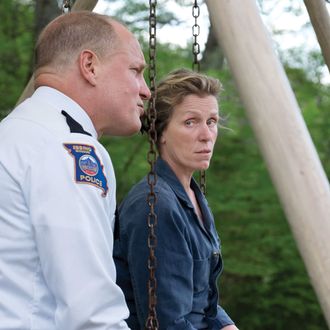
What to make of the Irish-born Martin McDonagh, whose plays stake out a border between the whimsically mundane and the tragically murderous and whose movies (In Bruges, Seven Psychopaths) push the edge even more perversely? His Three Billboards Outside Ebbing, Missouri was the audience favorite at this year’s Toronto Film Festival, and there’s mad buzz over Frances McDormand’s performance as a mother who — understandably — can’t let go of the rape and murder of her teenage daughter, which has, in less than a year, become a cold case.
The police and citizens of Ebbing want her to shut up already, which is why McDormand’s Mildred rents the eponymous billboards on which she calls out the sheriff, Willoughby (Woody Harrelson), for his alleged inaction. Willoughby has cancer, though, and the town thinks Mildred’s harping is unseemly. A deputy named Dixon (Sam Rockwell) with a history of brutality is particularly incensed by the public shaming. Are they protecting someone, or is this really just a matter of time passing and life moving on?
The movie is instantly gripping, a finely-calibrated a mixture of foggy melancholy and quirk, the rude comedy pushing at the boundaries of the tragic premise. And McDormand is, indeed, something to behold. Her Mildred is already worn down — every cell in her body seems weary. But she keeps dragging herself into confrontations and battering the cops despite no witnesses and no DNA matches. The owner of the billboard company (that ingratiating weirdo Caleb Landry Jones) is easily bullied into submission. She blows off the sweet, romantic overtures of James (Peter Dinklage, with his moist eyes) while referring to him acidly as “the midget.” And she seems ready to do physical battle with Rockwell’s Dixon, who begins to take on the sad affect of Stan Laurel while his poisonous mother (Sandy Martin) — who’d give Norman Bates the heebie-jeebies — directs him to put the meddling woman in her place.
Rockwell’s performance is too complex to graph. You don’t know what’s going on in his head — or in most of the other characters’ heads. Through his heroine, McDonagh forces his characters out of their comfort zones, and they hit notes of anger, petulance, and sometimes tenderness that surprise even them. McDonagh is testing his tragic premise and testing us, bringing down the walls of convention and taste. This feels like no other movie.
But then Mildred firebombs her own side and Three Billboards Outside Ebbing, Missouri becomes both broad to the point of silliness and even more hideously graphic in its descriptions and imagery. That’s when I stopped going along with the ride — when I could no longer reconcile McDonagh’s madcap incongruities with the horror of the original crime and the grief of a mother struggling to cope with so primal an injury. Are the audiences who’ve so far loved this movie more flexible for accepting McDonagh’s abrupt swerves in tone? Possibly. But I think that McDonagh has succeeded in so thoroughly psyching them out that they’re afraid to call foul.
*A version of this article appears in the October 30, 2017, issue of New York Magazine.


